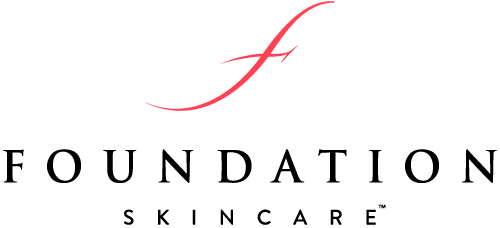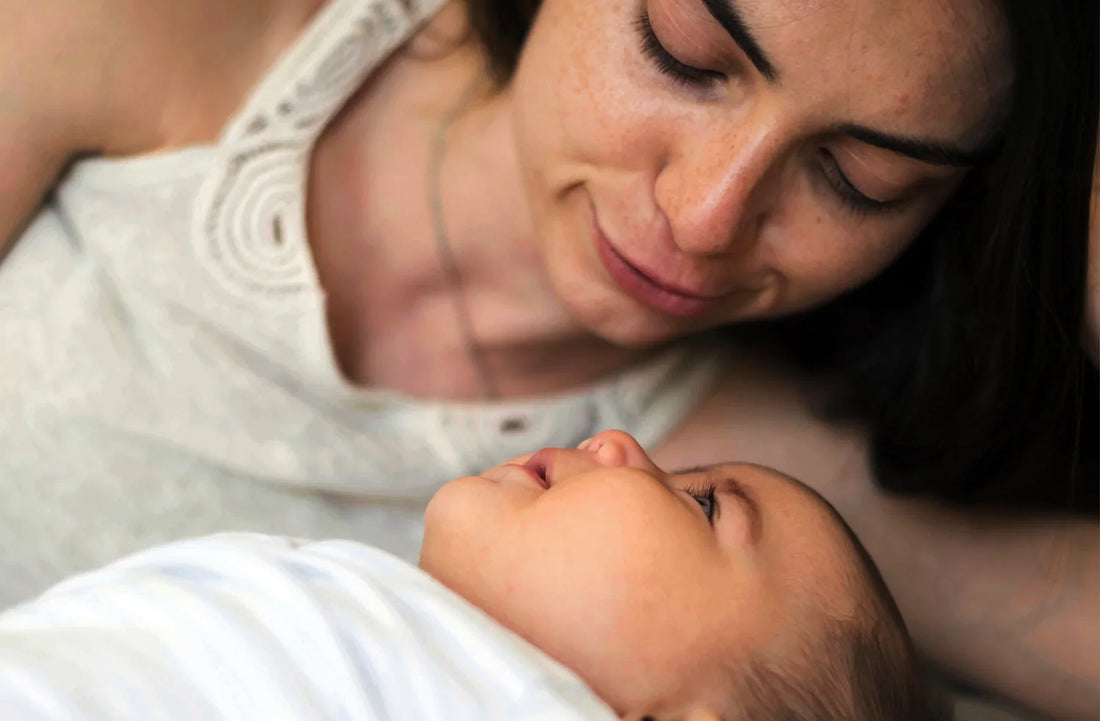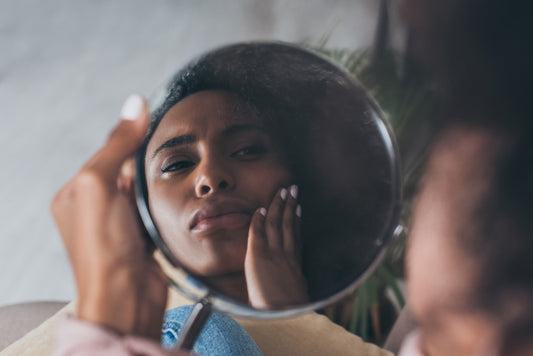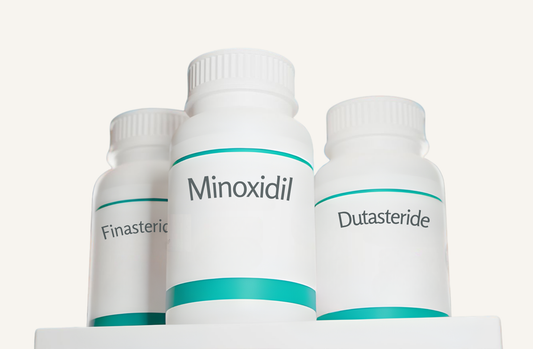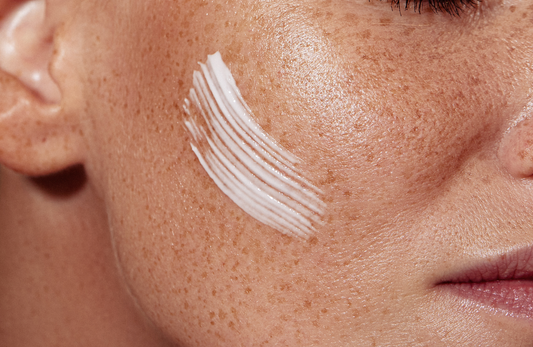Postpartum hair loss is the excessive shedding of hair after you’ve given birth. It is considered to be a normal part of pregnancy, occurring in about half of women who have recently had a baby.1 It does tend to resolve on its own after about six months to a year2, however, this can feel like a very long time when you’re watching your hair fall out at an alarming rate.
Luckily, there are several vitamins and other natural treatments that can help lessen postpartum hair loss, which we’ll go over in this article.
Remember, if you’re currently pregnant or breastfeeding, be sure to consult with your doctor before introducing any new vitamins, supplements, or medications.
When Does Postpartum Hair Loss Happen?
For most women, postpartum hair loss doesn’t start immediately after giving birth, but starts about three months after giving birth.2
The reason behind this timing is hormonal fluctuations, which affect the hair growth cycle. During pregnancy the body’s estrogen levels are elevated, which temporarily lengthens hair’s growth phase (or anagen phase).2 This may be why during pregnancy your hair feels thicker and fuller.
However, as the hormones drop after pregnancy (which takes a few months), your hair quickly enters the resting phase (or telogen phase) which results in a lot of shedding.2
This can affect the entire scalp, but for most women it tends to be most noticeable along the front hairline.3
Causes of Postpartum Hair Loss
As we mentioned, fluctuations of the hormone estrogen during and after pregnancy are the main cause of postpartum hair loss.2
In addition to these hormonal fluctuations, nutritional deficiencies and stress can exacerbate hair loss further — two things that often go hand-in-hand with having a newborn baby.
Studies show that people who are low in iron, folic acid, and zinc may have more hair loss than those who aren’t.4 Breastfeeding can actually make these nutrient deficiencies more likely, since it uses up so many calories and nutrients.5
Plus, the stress and lack of sleep associated with having a newborn can also cause hair loss.6
So combine falling levels of estrogen, an inability to retain nutrients during breastfeeding, increased stress, and a lack of sleep and you get the perfect recipe for hair loss.
How Long Does Postpartum Hair Loss Last?
Luckily, experts say that postpartum hair loss should only last about six months for most women. For some, it may last longer, but should resolve within a year.2
Tips for Treating Postpartum Hair Loss
While you can’t prevent postpartum hair loss entirely when it is caused by natural hormonal fluctuations in the body, you can help lessen it by increasing your nutrient intake, decreasing stress, and being mindful about how you care for your hair. More specifically, you can:
Eat a Nutrient-Rich Diet
Mayo Clinic recommends getting plenty of healthy fats and protein in your daily diet for hair health, as well as overall health. They also note that the all-popular low carb diets may result in thinner hair.7 Here are some nutrient-rich hair-healthy foods they recommend7:
- Unsaturated fats, like olive oil
- Nuts and seeds
- Avocados
- Lean meats like chicken or turkey
- Salmon, tuna
- Lean red meat (for iron)
- Leafy green vegetables (spinach, kale)
- Fortified cereals
- Eggs (including the yolk)
- Yellow vegetables (like sweet potatoes or winter squash)
Manage Stress
We know it may seem impossible to manage stress and get enough sleep when you have a newborn, but do what you can. Stress has been proven to increase hair loss6, and lack of sleep increases stress.8
You might try:
- Sleeping while your baby sleeps: Newborns need about 16 to 18 hours of sleep per day, and will often take naps anywhere from two to four hours.9 It may not come naturally to you, but if you can, try to nap while your newborn is napping– especially if you’re staying up with them during the night.
- Skipping household chores for a while: It won’t hurt you to let the house get a little messy for a while, if it means you can sleep. Instead of stressing about doing the laundry, take the opportunity to nap if you can.
- Share nighttime baby duties: If you have a partner or somebody to share nighttime baby duties with, be sure you’re insisting upon it. Taking on all of the nighttime baby duties will only make one person extremely sleep deprived and stressed.
- Practice good sleep hygiene: Avoid caffeine in the afternoon, turn off electronics in the hour before bed, and (as much as you can) stick to a regular sleep schedule.
- Continue to exercise and take time for yourself: Yes, with a newborn this may seem difficult, but it’s important to continue taking good care of yourself so that you can care for your baby (and not lose all of your hair in the process!) Daily exercise is not only one of the best stress management tools, but it has also been shown to help balance hormones.10
Practice Gentle Hair Care
- Avoid heat and harsh chemical treatments when styling your hair
- Use a frizz-friendly shampoo and conditioner
- Detangle with a wide-tooth comb
- Use a smoothing oil
- Gently dry your hair
- Use conditioner or leave-in hair moisturizer after shampooing
- Get a haircut every 4 months to remove split ends and promote hair growth
Drink plenty of water
Making sure you stay properly hydrated will not “increase” hair growth, but it is important to your overall health — which will ultimately be good for your hair. Experts recommend that women drink at least nine cups of water per day11, and at least 16 cups of water per day while breastfeeding12.
Key Vitamins and Minerals for Healthy Hair Growth
While eating a nutrient-rich diet may be enough most of the time, if you’re struggling with postpartum hair loss, it may be a good idea to add in some supportive supplements that include: Vitamin D, zinc, biotin, vitamin A, vitamin C, vitamin E, iron, and folic acid.
Foundation Skincare’s UnTangled Hair Supplement includes all of these vitamins, as well as several other nutrients that promote hair growth and minimize hair loss.
For example:
- Selenium: This helps support the thyroid, which plays a role in regulating hair growth.13
- Marine collagen: Marine collagen has been shown to promote hair growth.14
- Saw palmetto: Research shows that saw palmetto may block DHT, a hormone related to testosterone that shrinks hair follicles.15
- Horsetail Extract: This stimulates hair growth as well.
We recommend combining UnTangled with our topical Hair Serum for best results. This goes directly on the scalp in areas where hair is thinning to promote new hair growth directly from the root. Hair Serum is dermatologist-formulated and also contains saw palmetto, as well as Stimucap, niacin, and apple stem cells, which prevent further hair loss and promote new growth.
One money-saving option: Order the UnTangled Essentials Kit which includes two bottles of Hair Serum and one bottle of UnTangled for a two month supply priced at over a 20% savings. If you try it and like it, you can subscribe to receive the kit every two months for an additional 15 percent off.
Can You Prevent Postpartum Hair Loss?
Unfortunately, postpartum hair loss can’t be entirely prevented since it mostly occurs due to naturally fluctuating estrogen levels after pregnancy.
When To See A Doctor
If you continue to see hair loss after six months, experts recommend speaking to your doctor as this could be due to another condition like an iron deficiency or thyroid disease.2
Even though postpartum hair loss is a temporary and normal part of pregnancy, that doesn’t make it any more pleasant. Luckily, there are things you can do to help minimize the shedding, including getting adequate nutritional support, managing stress, getting enough sleep, and practicing gentle hair care.
The combination of Foundation’s UnTangled and Hair Serum can also help minimize shedding and promote new hair growth within as little as thirty days. Within 90 days, hair may feel softer, thicker, and shinier; and with consistent use, these two products should strengthen your hair and make it grow faster.
Learn more about how these products work together and find more tips on maintaining healthy hair and skin in the FS Blog.
References:
-
https://www.lancastergeneralhealth.org/health-hub-home/motherhood/fourth-trimester/the-truth-about-postpartum-hair-loss
-
https://my.clevelandclinic.org/health/diseases/23297-postpartum-hair-loss
-
https://www.ncbi.nlm.nih.gov/pmc/articles/PMC3884776/
-
https://www.ncbi.nlm.nih.gov/pmc/articles/PMC5315033/
-
https://www.betterhealth.vic.gov.au/health/healthyliving/breastfeeding-and-your-diet
-
https://www.mayoclinic.org/healthy-lifestyle/stress-management/expert-answers/stress-and-hair-loss/faq-20057820
-
https://www.mayoclinichealthsystem.org/hometown-health/speaking-of-health/get-radiant-hair-skin-and-nails-naturally
-
https://www.ncbi.nlm.nih.gov/pmc/articles/PMC6448892/
-
https://www.hopkinsmedicine.org/health/wellness-and-prevention/new-parents-tips-for-quality-rest
-
https://www.piedmont.org/living-real-change/how-exercise-helps-balance-hormones
-
https://nutritionsource.hsph.harvard.edu/water/
-
https://www.eatright.org/health/pregnancy/breastfeeding-and-formula/nursing-your-baby-what-you-eat-and-drink-matters
-
https://www.ncbi.nlm.nih.gov/pmc/articles/PMC4454174/
-
https://www.ncbi.nlm.nih.gov/pmc/articles/PMC9569759/
-
https://www.ncbi.nlm.nih.gov/pmc/articles/PMC7706486/
